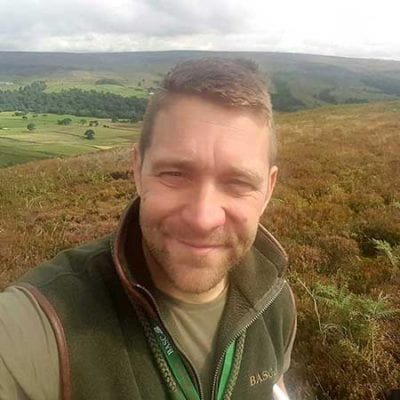Leave your BBQ at home

Gareth Dockerty
The May Bank Holiday is a favourite time for people to get out and about in the countryside. However, with the risk of wildfires currently very high, the barbecue is one item to leave at home says Gareth Dockerty.
Highly vulnerable to wildfire
As we exit the latest lockdown restrictions, its fair to say that wildfires may not be high on the list of concerns for many people across the country.
However, after a spell of dry weather, our uplands are currently extremely vulnerable to unplanned fires. This means we are at an increased risk of wildfires.
Sadly, most devastating wildfires are caused by people starting fires intentionally or recklessly. It is an easy yet potentially costly mistake to light a barbecue or have a campfire as you relax with friends within a stunning moorland landscape.
Risk higher in Spring and Summer
Grouse moors make up a large part of moorland across Northern England. Gamekeepers and the shooting community are proud of these magnificent landscapes which feature a thriving range of wildlife and make up part of the UK’s largest carbon store.
Many of these moorlands offer open access and attract more than 30 million people annually. From cyclists and walkers, to bird watchers and artists, grouse moors managed by the shooting community provide a unique setting and are the backdrop for thousands of businesses.
However, increased visitor numbers and a high fuel load in the form of last year’s dead vegetation leave the uplands at a higher risk of wildfire over the spring and summer months. The issue escalates further with seasonally hot and dry weather.
Wildfire reports increase
Sadly, reports of wildfires are now coming in thick and fast again. A spell of relatively dry weather, combined with the ease in Covid-19 restrictions, has seen higher numbers of wildfires on moorland across the UK in recent weeks.
Wildfires have increased consistently each year, with 2020 (even with the Covid restrictions) branded ‘the UK’s unprecedented fire season’. Last year saw 128 wildfires set light to the countryside in Lancashire alone.
The spring and summer months see the occurrence of 92 per cent of wildfires in England each year. The frequency of these is highest over on weekends and Bank Holidays.
Why are wildfires so devastating?
Fire has been part of the natural cycle of these landscapes for hundreds, if not thousands of years. Indeed, many moorland plants like heather have evolved to survive being burnt.
However, the increased severity of wildfires is causing issues for wildlife, humans and our climate. A severe wildfire will take the land years, if not decades, to recover from.
Moorlands are also home to some of the UK’s most threatened species including birds like the iconic curlew. The curlew is a large ground-nesting wading bird that breeds on grouse moors, yet has been in decline nationally by around 50 per cent over the last few decades.
The curlew has become the symbol for wading birds declining across the globe. A wildfire raging across moorland in the spring or summer is catastrophic to these already vulnerable birds.
Keeping the carbon locked in
The peat below moorland is the UK’s largest carbon store and ensuring this stays locked into the ground is a key priority.
A wildfire can ignite the peat below and release thousands of tonnes of carbon into the atmosphere in a matter of days, adding to our climate change emergency. Our peatlands have been described by the government as ‘the UK’s rainforest’ and must be protected.
The wildfire on Saddleworth Moor in 2018 has cost over £20 million to date. It released the equivalent carbon to 100,000 family cars’ annual emissions, polluting the air for over 4.5 million people.
Similarly, the wildfire started by a disposable barbecue on Darwen Moor in 2020 could have killed over 300 pairs of rare nesting wading birds and cost more than £10 million. All of this is a huge price to pay for a sausage or burger.
What does the shooting community to control wildfires?
The shooting community plays a key role in the prevention and control of wildfires across the country. Just some of their work includes:
- Investing in the latest firefighting equipment, from ATV vehicles to mobile water fogging units to put out wildfires
- Working with organisations like the fire service and National Parks to create wildfire management plans on a landscape scale
- Blocking over 2,945 km of old agricultural drains on grouse moors in the last ten years to rewet moorlands, improve habitat and reduce wildfire risks
- Reducing the vegetation wildfire fuel load through grazing, mowing and licenced cool prescribed burns in the autumn and winter months
- Educating thousands of children and visitors about the dangers of wildfires and patrolling high-risk areas
So effective are shooting’s keepers and curators of the moors that in 2020 alone, they dealt with more than 1,000 wildfires by direct intervention before the emergency services were called upon.
Play your part in preventing wildfires
The combination of people starting fires and potentially more extreme dry weather due to climate change seems to be increasing both the occurrence and severity of wildfires across the UK.
It is essential that everyone visiting our precious uplands does their bit to save lives, wildlife and carbon by leaving the barbecue at home.
Let your own legacy to these areas be helping struggling businesses recover from the pandemic by enjoying a meal in a cafe, restaurant or pub, rather than being the cause of a devastating wildfire.
Want to read more on wildfires?
Read our assessment of the facts and myths around UK wildfires here
